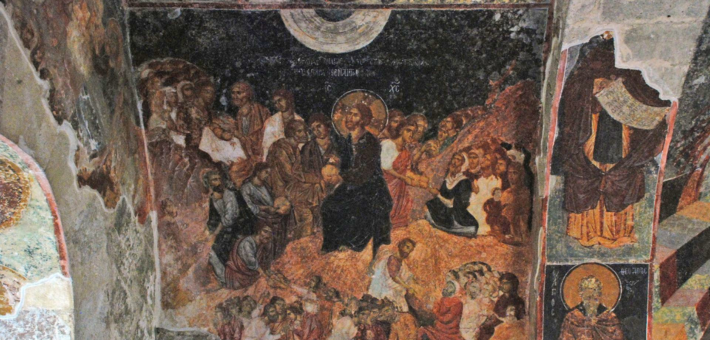Commentary on Isaiah 55:1-5
The exilic and post-exilic sections of Isaiah, beginning in chapter 40, reckon with questions of the ongoing message of a religious tradition in the face of questions of divine justice and divine reliability. In other words, what do words of abundance and promise, of covenant and loyalty, mean after the destruction of the holy city of Jerusalem and the scattering of God’s holy people? How shall the strong and sure tradition be interpreted into a new situation?
Isaiah 55:1-5 speaks words of hope, likely to a people returning to Jerusalem. These verses, rich in imagery and tradition, communicate themes of divine invitation, renewal and restoration, and vocation. These verses are both a reaffirmation of God’s presence in their midst and a reinterpretation of what God’s presence means when God’s people find themselves in a new time and place.
Come to the water
The call for the thirsty to come to the water is a reversal of earlier verses in Isaiah that described Judah as a garden without water (Isaiah 1:30) and the LORD as withholding water from Jerusalem (Isaiah 3:1). Beginning in Isaiah 40, water becomes a sign of life as the LORD once more pours water on a thirsty land (see Isaiah 41:18; 43:20; 44:34; 49:10). Isaiah 55:1 joins this theme of renewal and restoration. Much needed water will be available for all who thirst, and grain would be available without cost of silver. A season of abundance and satiation has arrived.
The images of water and silver in Isaiah 55:1 may also recall Isaiah 1:22 where silver dross (basically silver scum) and beer mixed with water are part of a series of images that describe Jerusalem’s descent from a righteous and prosperous city on a hill to the very opposite. In Isaiah 55 the people are not in need of silver, scummy or otherwise, and their water is for refreshment rather than for diluting their drink, whether for personal use or to increase profit. These images that once signified their weakness and sinfulness are now symbols of salvation. Jerusalem will be welcomed with a feast to delight in what is good.
Outside the book of Isaiah, Woman Wisdom in Proverbs 9:1-6 also invites hearers to a banquet table where they may eat of her food and drink of her wine. As in Isaiah 55, those feasting at this meal will find life. In both these texts, the one extending the invitation matters as much as the food itself, for it is the host who offers life. In Proverbs 9 that host is Woman Wisdom, a figure connected intimately with God, who is the host offering a divine invitation in Isaiah 55.
An eternal covenant
Verses 3-4 recall the so-called Davidic covenant that David’s house and descendants would rule in Jerusalem (2 Samuel 7, though the word covenant does not actually appear in that chapter). The end of the Davidic dynasty, along with the destruction of God’s own temple residence on Mount Zion, had raised questions for those who had trusted that the Davidic monarchy and the temple on Mount Zion signaled security and safety for the holy city. The declaration had been that God would build David’s descendants into a house that would rule forever (‘olam), yet the Babylonians had succeeded in conquering it.
That word forever or everlasting, as New Revised Standard Version translates, returns in Isaiah 55:3. This time, though, the covenant is not with an individual but with the whole people as an extension of God’s steadfast love of David. The New Revised Standard Version translation, “I will make with you an everlasting covenant,” is somewhat more declarative than the Hebrew, which is cohortative and better translated as “Let me make with you … ”, continuing the invitational tone begun in verse 1. Surely a reference to the Davidic tradition, the phrase “everlasting covenant” further recalls the covenant with Noah (Genesis 9:16) and the covenant with Abraham (Genesis 17:13) as inherited by Isaac (Genesis 17:19), and Sabbath practices as described in Exodus 31:16. This pronouncement of an everlasting covenant is fully aligned with the practice of Judah’s God, and its restatement here is yet another sign of a renewed relationship.
Verse 4 further describes David and his vocation before transitioning into verse 5 which describes the future vocation of the people called to this feast. David, claims verse 4, was a witness to the peoples, even as he was a ruler and commander of peoples. While it is easy to see the words ruler and commander associated with David, the king and military hero, the word witness is surprising here. The word shows up nowhere in the Davidic narratives in 1-2 Samuel, but military strength would have been a sign of a strong god as was peace and prosperity in a land.
Your God glorifies you
Verse 5 is linked with verse 4 with the introductory word “behold” (hen). As David had been a witness and commander to peoples, so now the people of this new covenant will be called upon for that same purpose. It is challenging to know exactly what it means for nations to call upon this people in the process of being renewed, but it aligns with images such as Isaiah 2 that describe many peoples streaming to Zion, the mountain of the LORD (Isaiah 2:2-5). Isaiah 55:5 sets Israel once more as an earthly sign of the LORD, the God of Israel and as a people to whom other nations will turn. This reflection of God’s glory out into the world is their purpose and their calling, what we might call their vocation.
These three themes are present throughout scripture, and their confluence in these five short verses offers preachers a chance to think with congregations about how these themes might be reinterpreted for yet another time and another place. Divine invitation alongside a promise and experience of renewal and restoration are surely necessary ingredients as congregations continue to discern their vocations and callings for the sake of God’s world.


August 6, 2023